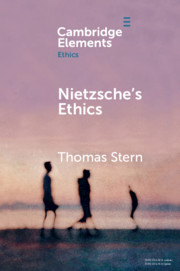Element contents
Nietzsche's Ethics
Published online by Cambridge University Press: 18 December 2019
Summary
- Type
- Element
- Information
- Series: Elements in EthicsOnline ISBN: 9781108634113Publisher: Cambridge University PressPrint publication: 02 January 2020
Bibliography
Primary Sources
Secondary Sources
- 35
- Cited by

